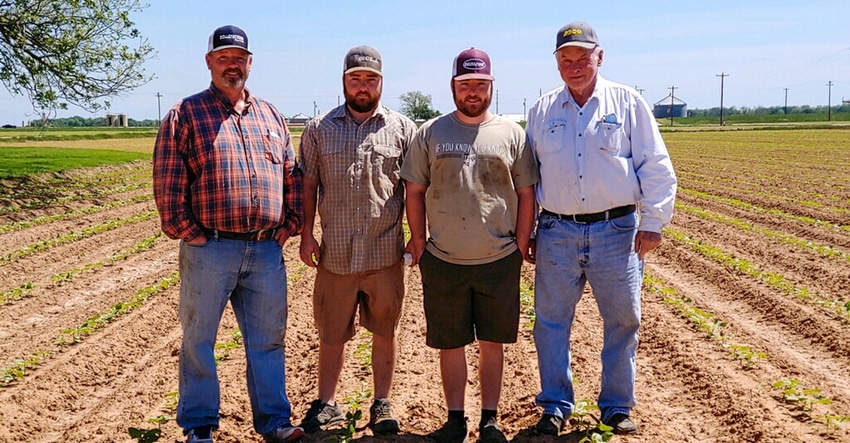
A year ago, producer and cow/calf operator Jay Wilder stood in one of his fields in Snook, Texas, surveying the endless cotton bolls blanketing his field from an unharvestable 2018 crop. In 2020, Wilder's view is much different.
"We've got really good conditions," says Wilder, who farms with his father Joe and twin sons Spencer and Jayce. "Throughout the winter, we haven't had a whole lot of rain, but we were able to get all of our fieldwork done in February. We've had enough rain to keep good moisture in the bed, and then last weekend (end of March), we got about two inches of rain."
Wilder grows cotton and sunflowers and grain sorghum, which he says is about 75% planted. "So far, everything we've planted has come up. I don't anticipate having any trouble. We're in great shape."
Sunflowers are a new addition to Wilder's farm. He contracts his sunflower seeds to Thomas Moore Feed, a birdseed company owned by Matt Moore and located about 20 miles from Snook.
"Matt's been working with H-E-B for about six or seven years and decided to get some growers closer to home," Wilder says. "We thought we'd try it out."
They've planted both irrigated and dryland sunflowers. "The irrigated are under center pivot. These are supposed to take about 85 days, so in early June, we'll harvest those and then plant a second sunflower crop into that same field. We have the heat units to get it done, but it can get iffy on the back end because it's about the same time we'll be harvesting cotton as well as it's hurricane season."
Wilder will store harvested seed in his grain bins and deliver seed as needed to the birdseed company. "He'll pay us for storage as well," Wilder says. "The last several years, we haven't put much grain in storage; we've been shipping it straight to the port, so at least we'll be able to utilize our grain bins."
In addition to row crops, the Wilder family runs around 500 head of mama cows in their cow/calf operation. "We're calving right now -- probably about 70% through. Like everything else, we need the market to improve, but we've got some time."
COVID-19
Wilder refers to the dramatic drop in cattle and commodity market prices due to the COVID-19 pandemic. He feared an interruption in seed deliveries or his local co-op closing, but his seed salesman and co-op manager assured him that wouldn't be an issue. But what does worry him is the markets.
"With oil being $23 a barrel, that's devastating for Texas cotton, and I would assume the other commodities will follow. Milo is $7.65 or so delivered to port. That's not terrible, but it could be better and it dang sure could be worse.
"I haven't checked cotton in a while, and my marketing guy hasn't called either, so it's probably not going in the right direction," he says with a laugh.
The cattle market has been better. Wilder says about three weeks before COVID hit, he sold his culled bulls. "The market was really good. They were all in the mid to upper 90s. One sold for $1.05, and these were bulls that went to the packer. That market has been pretty good."
But whether it's the commodities or cattle markets, Wilder, who is also president of the Texas Sorghum Association, says he's optimistic there's still time for the market to recover.
About the Author(s)
You May Also Like






